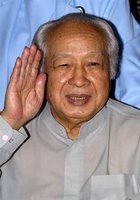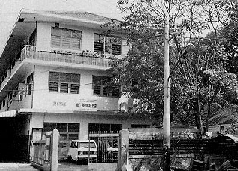 The Jakarta Post, Jakarta
The Jakarta Post, Jakarta Iran's President Mahmoud Ahmadinejad enjoyed a warm welcome Thursday from students at the University of Indonesia in Depok, south of Jakarta.
The energetic president was impressed by the questions and thankful for the students' support for Iran in its dispute with the United States over its nuclear program.
With the help of a translator, Ahmadinejad delivered a lecture and then fielded questions from students. He was particularly pleased by a question posed by Fatimah, who asked about Iran's ability to stand up to U.S. pressure.
"Does your excellency get inspiration from the martyrdom of Imam Hussein during Assyura?" she asked, referring to the death of Prophet Muhammad's grandson Hussein, commemorated in Shiite tradition.
"That is an interesting subject and she (the student) deserves a scholarship. The rector should apply to the Iranian Embassy for a scholarship for this student," Ahmadinejad said to applause.
Ahmadinejad also enjoyed electronic engineering student Rizki's enthusiastic support for Iran's nuclear program.
"I personally support Iran's nuclear program. Will Iran accept Indonesians who want to study nuclear technology?" Rizki asked.
In his one-hour lecture, the Iranian leader said students played an important role in shaping the future. "For me, the youth are a precious capital," he said.
The lecture was supposed to end at 11 a.m., but Ahmadinejad spoke for an additional 45 minutes.
The Iranian president used the opportunity to once again denounce Western countries. "While other energy sources are limited, nuclear power is not. We will continue with our nuclear program," he said.
A group of students raised banners reading "Iran in My Heart" and "Nuclear for Peace" after the lecture ended.
"I love you all," the president replied.
Most students in attendance praised the Iranian leader. "Our leaders should follow him and speak out against (international) tyranny," said Dipo, a computer technology student.
Psychology student Yosi Molina suggested that more time be allotted for similar events in the future, so visiting dignitaries could speak longer.
Later in the afternoon, he gave another lecture at Syarif Hidayatullah State Islamic University in Ciputat, Tangerang. Earlier in the morning, he visited Kalibata Heroes Cemetery in South Jakarta.
The response by a group of Indonesian editors later in the evening was a little less warm after the Iranian leader kept them waiting for nearly two hours to an invitation for an "afternoon tea" at Hotel Mulia, where he is staying for his state visit to Jakarta.
When asked whether he saw a role for Indonesia to mediate and ease tension between Iran and the United States, he said: "The best thing to help under the current situation is to ask the troublemaker to stop making trouble for us."
But he said he would welcome an Indonesian role in a group of like-minded countries to have dialog to seek global peace.
He underlined the need for nations in the world to work toward "peace that is based on justice and universal teachings of religions".
"Peace that is not founded upon justice will not be sustainable," he added.
He toned down his anti-Israel rhetorics when asked whether he would carry out his threat against Israel if Iran was attacked by the United States.
"There is no need to attack the zionist state. It will self destruct."
On Friday, the President is scheduled to meet with leaders of Indonesia's large Islamic social organizations as well as with leaders of the House of Representatives before ending his state visit.
He will fly to the holiday island of Bali to take part in the D-8 summit of countries with large Muslim populations this weekend.


